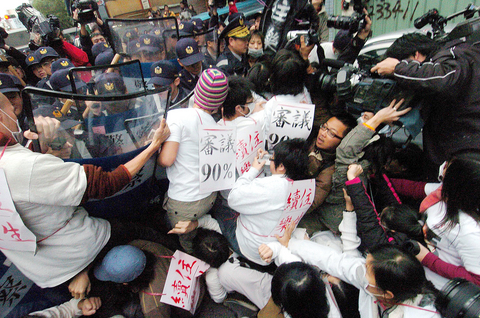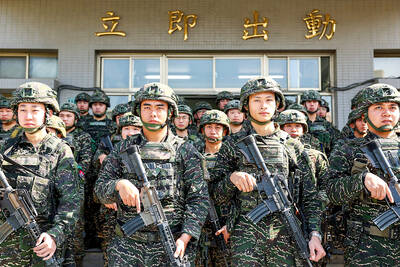Politicians aren't listening and the police have used bizarre tactics to disrupt their protests, so activists fighting to save Losheng Sanatorium are cranking up the volume with four days of rock concerts to raise awareness for their cause.
More than 30 indie acts — including punk group 88 Guava Seeds (八 十 八顆芭樂籽), Hakka folk combo Hohak Band (好客樂隊), post-rock band Orange Grass (橙草) and underground collective KbN — are scheduled to perform at the Ideal Art Festival (理想藝術節), which runs this and next weekend near Fujen Catholic University (輔仁大學) in Sinjhuang Township (新莊), Taipei County.
The goal: save the Losheng — or Happy Life (樂生療養院) — leprosarium, a hospital and home for lepers recently designated a temporary historic site. Taipei City's Department of Rapid Transit Systems (TRTC) wants to demolish the complex to make room for an MRT station. Advocates say the move would destroy an important piece of local history and disrupt the lives of Losheng's elderly residents.

PHOTO: TAIPEI TIMES
Festival planner Zoe Yu (游佩勳) said the concert would also call attention to "rude" methods employed by police to disperse previous protests. Officers blocked a group of 100 students and wheelchair-bound residents on Sunday from presenting a petition at the home of Premier Su Tseng-chang (蘇貞昌). Police hauled some of the students off in a van and abandoned them in the mountains near Neihu, Yu said.
"We have to be clear about our human rights and we want the government to recognize the people's rights. You can't just take someone's home and treat the patients the way the government has been treating them," Yu said.
Built in 1930 during Japanese colonial rule, Longsheng is the only public leprosarium in Taiwan and has housed more than 300 patients, most of whom were forced to leave their families in their teens and are now in their 60s and 70s. Following a policy originally instituted by the Japanese, people with leprosy, or Hansen's disease, were segregated by law until the 1980s, and Losheng became a self-sufficient community.
In 1994, Taipei County sold the land on which the sanatorium stood to the TRTC for the construction of part of the Sinjhuang MRT line. Residents were not consulted and did not learn of the sale until nearly a decade later, when demolition work started.
Residents and human-rights groups have campaigned to save the leprosarium since 2004, petitioning official agencies such as the Taipei County Government, the Executive Yuan and the Council for Cultural Affairs.
In November 2005, the Council of Cultural Affairs designated Losheng a "temporary historic site," giving Taipei County six months to review the complex's historical value. The county allowed the six months to pass without conducting the review — deliberately, activists say — passing responsibility over the decision back to the central government.
Experts say the MRT's power and water treatment plants could be moved to allow for the co-existence of the sanatorium and the MRT line. But the TRTC estimates rerouting the MRT could cost more than NT$2 billion (US$63 million) and delay the project by more than three years. Politicians including Vice President Annette Lu (呂秀蓮) have spoken in favor of the demolition.
If they lose their battle to save their home, Losheng residents will be relocated to the newly built Huilung Community Hospital.
The Ideal Art Festival is organized by the Youth Losheng League, Internet culture portal CampoLive (campolive.blogspot.com), the FAM Music and Art Alliance (FAM音樂藝術聯盟, www.twfam.com) and Shibishou (詩筆獸), the group of artists and musicians who organized last month's Freak Out Beast (吵年獸) music festival. In addition to the concerts, there will be poetry readings and an outdoor market.

That US assistance was a model for Taiwan’s spectacular development success was early recognized by policymakers and analysts. In a report to the US Congress for the fiscal year 1962, former President John F. Kennedy noted Taiwan’s “rapid economic growth,” was “producing a substantial net gain in living.” Kennedy had a stake in Taiwan’s achievements and the US’ official development assistance (ODA) in general: In September 1961, his entreaty to make the 1960s a “decade of development,” and an accompanying proposal for dedicated legislation to this end, had been formalized by congressional passage of the Foreign Assistance Act. Two

President William Lai’s (賴清德) March 13 national security speech marked a turning point. He signaled that the government was finally getting serious about a whole-of-society approach to defending the nation. The presidential office summarized his speech succinctly: “President Lai introduced 17 major strategies to respond to five major national security and united front threats Taiwan now faces: China’s threat to national sovereignty, its threats from infiltration and espionage activities targeting Taiwan’s military, its threats aimed at obscuring the national identity of the people of Taiwan, its threats from united front infiltration into Taiwanese society through cross-strait exchanges, and its threats from

Despite the intense sunshine, we were hardly breaking a sweat as we cruised along the flat, dedicated bike lane, well protected from the heat by a canopy of trees. The electric assist on the bikes likely made a difference, too. Far removed from the bustle and noise of the Taichung traffic, we admired the serene rural scenery, making our way over rivers, alongside rice paddies and through pear orchards. Our route for the day covered two bike paths that connect in Fengyuan District (豐原) and are best done together. The Hou-Feng Bike Path (后豐鐵馬道) runs southward from Houli District (后里) while the

March 31 to April 6 On May 13, 1950, National Taiwan University Hospital otolaryngologist Su You-peng (蘇友鵬) was summoned to the director’s office. He thought someone had complained about him practicing the violin at night, but when he entered the room, he knew something was terribly wrong. He saw several burly men who appeared to be government secret agents, and three other resident doctors: internist Hsu Chiang (許強), dermatologist Hu Pao-chen (胡寶珍) and ophthalmologist Hu Hsin-lin (胡鑫麟). They were handcuffed, herded onto two jeeps and taken to the Secrecy Bureau (保密局) for questioning. Su was still in his doctor’s robes at